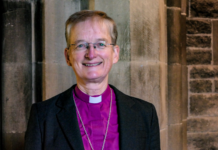The recent speech by the Bishop of Liverpool caused great concern among evangelicals on a number of counts. Following its publication, CEEC wrote privately to Bishop Paul to express this and we are aware of other evangelicals who also wrote to him.
We are grateful that Bishop Paul has publicly apologised for the fact that in a number of places he spoke in ways that “clearly conveyed a lack of respect for those who think differently” and overstepped “the limits of good manners, mutual respect and common courtesy”. We welcome this apology and assure him of the forgiveness he sought from those offended. We share with him a commitment to avoid speaking in such ways of those with whom we disagree. We hope that evangelicals will like him be willing to apologise and seek forgiveness when we fall short. This is particularly important as we engage in more conversations across our disagreements during the LLF process.
Bishop Paul was also clear in his apology that he remained committed to the substantive points he made. These included a call for the church to change its doctrine of marriage and many found not just the tone but the substance of his remarks unacceptable because contrary to Scripture and church teaching. This was particularly distressing given the speech took place alongside ordinations in which those ordained are asked by the bishop whether they will “faithfully minister the doctrine and sacraments of Christ as the Church of England has received them, so that the people committed to your charge may be defended against error and flourish in the faith?”.
We recognise that, as the bishops state on the opening page of the LLF book, there are a range of questions around marriage and sexuality where “there is disagreement within the people of God, including among us, the Bishops of the Church of England”. Nevertheless, during this period of learning together using LLF resources, the doctrine and discipline of the Church of England remains unchanged and the bishops have stated, “we are united as bishops in our commitment to promote peace in the Church and to strive for the visible unity of the church” (LLF, 423). All this clearly creates major challenges but the calling of a bishop is to be a chief pastor by being a teacher of “sound and wholesome doctrine” and maintaining “quietness, love and peace” (Canon 18.1). We hope and pray that, as we discuss and discern together, the words and actions of bishops will not risk shattering our fragile unity or making our learning and discerning together more difficult but will be consistent with their commitments in LLF and with faithful episcopal ministry in the form we have received it in the Church of England.
19 July 2021



